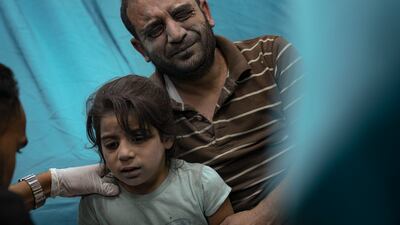With regard to Soraya Ebrahimi's report Rishi Sunak and James Cleverly visit Israel and wider region (October 19): Will Rishi Sunak pay a visit to the bombed Al Ahli hospital and see the injured children on both sides or does he just want to see the politicians and secure his seat?
Haseeb Ahmedi, Abu Dhabi
Thousands of innocent Palestinian women, children, old, young and unarmed are being murdered in cold blood by the Israeli occupation. When does this come to an end? Where are the human rights? Why does the world pretend to be blind?
Rahma Al Janidi, Dumyat, Egypt
America's support for Israel
With reference to James Zogby's op-ed How the US missed a chance to nip the Israel-Gaza war in the bud (October 17): It was never the US’s interest to “nip it in the bud".
Leila Almaeena, Dubai
War on children
About Shelina Janmohamed's op-ed In 100 years, what will children have learnt from Palestine and Israel? (October 19): The world is witnessing a tragedy in the Gaza Strip. Israel is galvanising to strike a lethal blow due to the unwarranted incursions made by the Hamas on October 7. So, once again, civilian men, women and children will be killed. An entire generation could be wiped out. An army of orphans will be created, full of bitter memories. This could have been avoided. Israel was constituted with the blessings of the UN. If Hamas or Palestinians still wish to contest this, they have to go to the UN or to an international Court. Slaughtering civilians, on either side, will not solve the problem.
Rajendra Aneja, Dubai
Even before the world could do enough for children suffering in war-affected Ukraine and several other nations, deadly attacks were witnessed in Israel and Gaza. Innocent civilians, including children, are suffering on both sides. This war has a high risk of spreading tension among neighbouring countries and involving powerful nations. Certainly, the world cannot afford another war. Nations, leaders and global citizens need to think and act rationally. Impulsive acts and emotional decisions can lead the entire world to catastrophe.
Ruhail Choudhury, Kolkata, India

